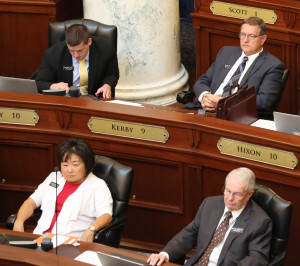The House Education Committee Thursday introduced a new bill to tweak contracts for educators who work extra days.

Pushed by Rep. Ryan Kerby, R-New Plymouth, on behalf of the Idaho School Boards Association, the bill would create a supplemental section of contracts, covering extra day assignments for certificated employees.
Kerby, the retired superintendent of the New Plymouth School District, said the change would make it so that extra service is not considered a property right subject to due process proceedings and bargaining negotiations.
Kerby said the change could apply to counselors, teachers, IT staff, professional-technical education instructors or nurses who work extra days before or after the regular school year.
Under the bill, Kerby said, educators who work extra time would be paid for extra days at the same rate they earn under standard contracts.
Committee members voted to introduce the bill on a voice vote. It is expected to return to the committee for a full hearing.
In other news:
The “60 percent” goal. The Senate passed a nonbinding resolution supporting the state’s defining education goal: boosting Idaho’s postsecondary completion rate to 60 percent.
In 2014, 40 percent of the state’s 25- to 34-year-olds have a postsecondary degree — and the number has actually dropped from 42 percent in 2012. The State Board of Education wants a 60 percent completion rate by 2020, in hopes of meeting the needs of Idaho employers.
“We do have a big job,” Senate Education Committee Chairman Dean Mortimer, R-Idaho Falls, said Thursday.
Mortimer hopes the resolution will increase public awareness about the 60 percent goal, adopted by the State Board in 2010.
With the 33-0 vote, Senate Concurrent Resolution 134 heads to the House.
Mastery-based education. Idaho schools may apply for the mastery-based pilot program approved by the 2015 Legislature.
State Superintendent of Public Instruction Sherri Ybarra’s staff posted application materials for the program this week.

In order to be eligible, schools and districts must commit to developing a mastery plan during the 2016-17 school year and commit to implementing the plan over four years.
A mastery-based system of education is one of the 20 reform recommendations issued in 2013 by Gov. Butch Otter’s Task Force for Improving Education. Students would no longer advance from grade to grade based on spending a year in class and earning a passing grade. Instead, they would need to demonstrate mastery of subject matter, and would advance through the education system at their own pace.
“Mastery education is truly a local initiative, and it’s very progressive,” Ybarra said in a written statement. “It can look different in a small rural school versus a large high school, and our great local leaders and their communities can still determine how to best meet the needs of their students.”
Mastery applications are due by 5 p.m. on March 11.
On Thursday afternoon, the Senate Education Committee introduced a bill that would cap the number of pilots at 20 — and could allow the state to approve fewer pilot sites.
Maniacs license plate. The House Transportation and Defense Committee wants to rewrite a specialty license plate bill designed to benefit the Orofino Joint School District.
Rep. Paul Shepherd, R-Riggins, is pursuing a new specialty license plate as a way to raise money for Orofino schools.
The proposal hit a snag, however, after several people testified that Orofino Junior-Senior High School’s mascot, the Maniacs, is offensive and stigmatizes mental illness.
The school is located near State Hospital North, which provides psychiatric treatment for adults suffering from mental illness.
Shepherd refers to the proposed speciality license plate as the “Idaho Friends of the Orofino Maniacs Plates.”
Committee members devoted about an hour to discussing the bill and accepting testimony.
By the end, the hearing took on a surreal quality. At one point lawmakers had three motions on the table. At one point, during a roll call vote, the committee’s secretary to mistakenly refer to Rep. Linden Bateman, R-Idaho Falls — prompting Rep. Phylis King, D-Boise, to hum the “Batman” theme song.
After the levity and musical interlude, the committee voted to send the bill to the floor for amendments, in hopes of removing the four instances of the word “Maniacs” from the bill itself.
The proposed license plate design features a drawing of the mascot, but not the word “Maniacs.”
Leadership premiums. Senate Education also introduced a bill to boost “leadership premiums” for some school staff.
The premiums are designed to reward employees for mentoring, taking on hard-to-fill positions or taking on other leadership roles. The current state law allows $850 premiums for “instructional and pupil service staff employees,” a group that includes counselors, nurses and occupational and physical therapists, among other employees.
The bill, proposed by the State Department of Education, would boost these premiums to $900. The increase would cost roughly $1 million in 2016-17.
Idaho Education News writer Kevin Richert contributed to this report.
